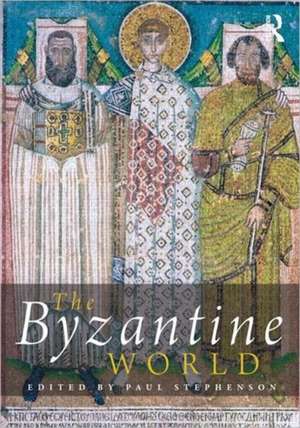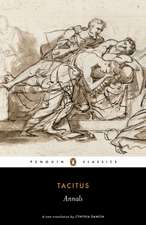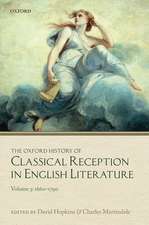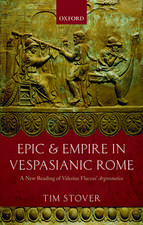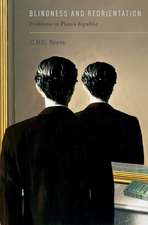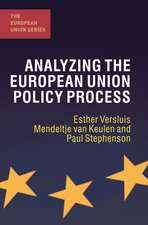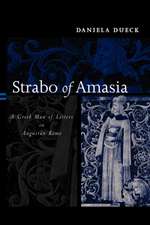The Byzantine World: Routledge Worlds
Editat de Paul Stephensonen Limba Engleză Paperback – 17 ian 2012
Each chapter offers an innovative approach to a well-known topic or a diversion from a well-trodden path. Readers will be introduced to Byzantine women and children, men and eunuchs, emperors, patriarchs, aristocrats and slaves. They will explore churches and fortifications, monasteries and palaces, from Constantinople to Cyprus and Syria in the east, and to Apulia and Venice in the west. Secular and sacred art, profane and spiritual literature will be revealed to the reader, who will be encouraged to read, see, smell and touch. The worlds of Byzantine ceremonial and sanctity, liturgy and letters, Orthodoxy and heresy will be explored, by both leading and innovative international scholars.
Ultimately, readers will find insights into the emergence of modern Byzantine studies and of popular Byzantine history that are informative, novel and unexpected, and that provide a thorough understanding of both.
Din seria Routledge Worlds
-
 Preț: 368.61 lei
Preț: 368.61 lei - 8%
 Preț: 431.39 lei
Preț: 431.39 lei -
 Preț: 349.23 lei
Preț: 349.23 lei - 15%
 Preț: 445.86 lei
Preț: 445.86 lei -
 Preț: 364.11 lei
Preț: 364.11 lei - 9%
 Preț: 1497.91 lei
Preț: 1497.91 lei - 18%
 Preț: 1513.19 lei
Preț: 1513.19 lei -
 Preț: 341.55 lei
Preț: 341.55 lei -
 Preț: 361.00 lei
Preț: 361.00 lei -
 Preț: 383.00 lei
Preț: 383.00 lei -
 Preț: 363.45 lei
Preț: 363.45 lei -
 Preț: 371.47 lei
Preț: 371.47 lei - 15%
 Preț: 411.45 lei
Preț: 411.45 lei -
 Preț: 356.34 lei
Preț: 356.34 lei -
 Preț: 352.39 lei
Preț: 352.39 lei -
 Preț: 351.61 lei
Preț: 351.61 lei -
 Preț: 365.83 lei
Preț: 365.83 lei - 8%
 Preț: 468.64 lei
Preț: 468.64 lei - 8%
 Preț: 413.18 lei
Preț: 413.18 lei -
 Preț: 361.62 lei
Preț: 361.62 lei -
 Preț: 351.99 lei
Preț: 351.99 lei -
 Preț: 361.66 lei
Preț: 361.66 lei - 9%
 Preț: 1538.70 lei
Preț: 1538.70 lei -
 Preț: 363.81 lei
Preț: 363.81 lei - 8%
 Preț: 469.41 lei
Preț: 469.41 lei - 30%
 Preț: 931.93 lei
Preț: 931.93 lei - 10%
 Preț: 337.02 lei
Preț: 337.02 lei - 25%
 Preț: 1370.78 lei
Preț: 1370.78 lei - 21%
 Preț: 339.14 lei
Preț: 339.14 lei - 18%
 Preț: 1622.48 lei
Preț: 1622.48 lei - 18%
 Preț: 1628.63 lei
Preț: 1628.63 lei - 30%
 Preț: 1217.34 lei
Preț: 1217.34 lei - 8%
 Preț: 434.83 lei
Preț: 434.83 lei - 36%
 Preț: 1486.60 lei
Preț: 1486.60 lei - 15%
 Preț: 559.31 lei
Preț: 559.31 lei - 28%
 Preț: 1421.29 lei
Preț: 1421.29 lei - 25%
 Preț: 1368.60 lei
Preț: 1368.60 lei - 18%
 Preț: 1240.98 lei
Preț: 1240.98 lei - 15%
 Preț: 597.75 lei
Preț: 597.75 lei - 28%
 Preț: 1362.47 lei
Preț: 1362.47 lei
Preț: 328.57 lei
Preț vechi: 379.85 lei
-14% Nou
Puncte Express: 493
Preț estimativ în valută:
62.87€ • 65.64$ • 52.03£
62.87€ • 65.64$ • 52.03£
Carte tipărită la comandă
Livrare economică 04-18 aprilie
Preluare comenzi: 021 569.72.76
Specificații
ISBN-13: 9780415527422
ISBN-10: 0415527422
Pagini: 640
Ilustrații: 32 black & white halftones, 24 black & white line drawings
Dimensiuni: 174 x 246 x 28 mm
Greutate: 1.23 kg
Ediția:1
Editura: Taylor & Francis
Colecția Routledge
Seria Routledge Worlds
Locul publicării:Oxford, United Kingdom
ISBN-10: 0415527422
Pagini: 640
Ilustrații: 32 black & white halftones, 24 black & white line drawings
Dimensiuni: 174 x 246 x 28 mm
Greutate: 1.23 kg
Ediția:1
Editura: Taylor & Francis
Colecția Routledge
Seria Routledge Worlds
Locul publicării:Oxford, United Kingdom
Cuprins
Part 1: The Byzantines and their World 1. The Byzantine Political Process at Crisis Point 2. The Rise of the Middle Byzantine Aristocracy and the Decline of the Imperial State 3. Money, Coins and the Economy 4. The Army and Military Logistics 5. The Study of Women and Children: Methodological Challenges and New Directions 6. Strong Women and their Husbands in Byzantine Historiography 7. Cherchez l’homme! Byzantine Men: A Eunuch Perspective 8. Slaves and Slavery 9. Monotheists, Dualists and Pagans 10. The Virtues and Faults of the Latin Christians Part 2: The Written World 11. Political Literacy 12. Byzantine Military Manuals: Prescriptions, Practice, and Pedagogy 13. De Cerimoniis and the Great Palace 14. Rhetoric and Performance 15. Letter-writing 16. Trends and Developments in the Byzantine Poetic Tradition 17. The Corps of Byzantine Historiography: An Interpretative Essay 18. Christians, Jews, and Muslims in Byzantine Italy: Medieval Conflicts in Local Perspective 19. The Miracles of Gregory Palamas by Philotheos Kokkinos 20. Writing for the Heart: the Spiritual Literature of Byzantium Part 3: Heaven and Earth: Byzantine Art and Architecture 21. What is a Byzantine icon? Constantinople versus Sinai 22. Defining Liturgical Space 23. Celestial Hierarchies and Earthly Hierarchies in the Art of the Byzantine Church 24. Unofficial Art and the Resistance to Orthodoxy 25. Constantinople and the Construction of Medieval urban Identity 26. The Practice, Perception and Experience of Byzantine Fortification 27. Imperial Outliers: Building and Decorative Works in the Borderlands and Beyond 28. The Medieval Progeny of the Holy Apostles: Trails of Architectural Imitation across the Mediterranean 29. Sacred Space from Constantinople to Venice Part 4: The World of Byzantine Studies 30. The History of Editing Byzantine Historiographical Texts 31. Byzantium in Nineteenth-century Greek Historiography 32. Pioneers of Popular Byzantine history: Freeman, Gregorovius, Schlumberger 33. A Case Study in the Emergence of Byzantine Studies: Serbia in the Nineteenth and Twentieth Centuries 34. Byzantium and Historical Sociology 35. Byzantium's European Future
Recenzii
'Byzantium is nowadays attracting more and more attention, and readers will find The Byzantine World both refreshing and at times astringent. This is no conventional handbook or survey. Under the direction of Paul Stephenson an array of scholars give us their own perspectives, which are often original and at times surprising. Stephenson himself explains why Byzantium has often been marginalized or misunderstood, and why it should matter to us today.' Averil Cameron, University of Oxford, UK
'Recommended' – Choice
'Recommended' – Choice
Notă biografică
Paul Stephenson is Reader in Medieval History at the University of Durham, and formerly was Rowe Professor of Byzantine History at the University of Wisconsin, a joint appointment with Dumbarton Oaks. He has researched and taught in the UK, Ireland, Germany, Greece, Sweden and the USA, and held fellowships from the British Academy, the Alexander von Humboldt Foundation, the Onassis Foundation and the Swedish Collegium for Advanced Studies. He is author of Byzantium’s Balkan Frontier (2000), The Legend of Basil the Bulgar-Slayer (2003) and Constantine: Unconquered Emperor, Christian Victor (2009).
Descriere
The Byzantine World presents the latest insights of the leading scholars in the fields of Byzantine studies, history, art and architectural history, literature, and theology. Those who know little of Byzantine history, culture and civilization between AD 700 and 1453 will find overviews and distillations, while those who know much already will be afforded countless new vistas.
